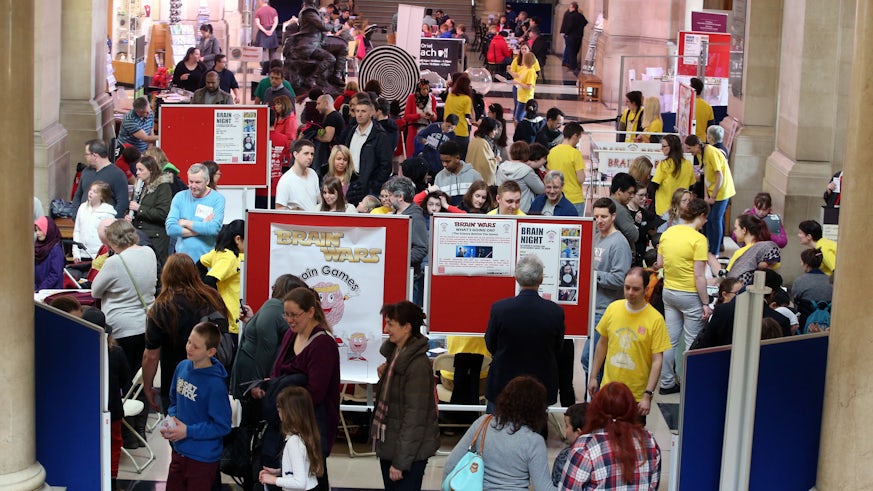Thousands attend Brain Games
15 March 2016

Interactive games focused on the brain prove a hit with children and families
A series of fun and educational activities to highlight the University’s brain research attracted more than 3,700 people to National Museum Cardiff on Sunday.
The free day-long Brain Games event was put together by neuroscience researchers drawn from Schools across the University as part of Brain Awareness Week.
The many activities are aimed at children eight to 11 years old but that did not stop all ages from having a go.

Activities included using brain waves to float a ball in a tube, a DIY brain surgery game and learning how your taste buds can be tricked.
Cardiff Racing, a team of predominantly mechanical engineering students, also proved popular with their single-seater race car which will compete around Europe against other student race cars.
Professor Derek Jones, Director of Cardiff University Brain Research Imaging Centre (CUBRIC) in the School of Psychology, said: “It’s fantastic that so many people from the University – more than 100 - have given up their time on a Sunday to engage the public in the work of the University, and to see so many of the public showing up to learn.
“It’s a great way to start international brain awareness week (http://www.dana.org/BAW/).”
Professor Frank Sengpiel, School of Biosciences, said it was the fourth time that Brain Games had been held at National Museum Cardiff.
“This year we are particularly grateful for the very generous support of Siemens, but also for the continued support of the Wellcome Trust, the Learned Society of Wales and Biotechnology and Biological Sciences Research Council (BBSRC),” he added.
Funding was also received from the School of Psychology via CUBRIC.

Dr Emma Lane, School of Pharmacy and Pharmaceutical Sciences, said more than 500 children had taken part in activities, with many parents, grandparents and other family members also having a go.
“Our stands were visited by people from all over Cardiff, all over Wales and even from France and Hungary as they visited the museum, with a total number of visitors exceeding 3,700,” she said.
“The enthusiasm of everyone involved was infectious and many children left excited and inspired by what they had seen.”
PhD students have been going into primary schools around Cardiff over the past few months to teach children about the brain and encourage them to attend the Brain Games event.
Hannah Furby, a PhD Student at CUBRIC, said: “This is now my fourth year of involvement in the Brain Games, which is a great opportunity as a PhD student to get out into the public and engage people about how the brain works and see the excitement that children get from it.”
The University’s new £44m Brain Research Imaging Centre is due to officially open later this year, with staff already starting to move in.
The Centre houses a combination of neuroimaging equipment unique within Europe.
